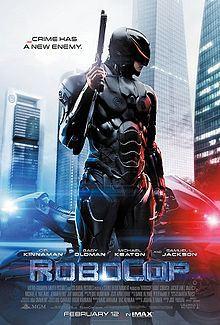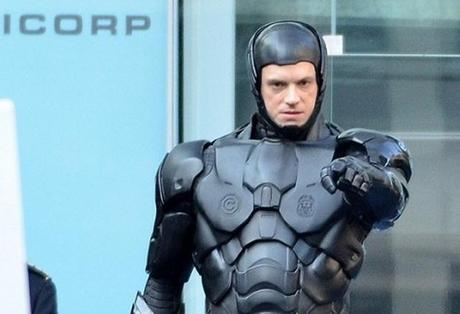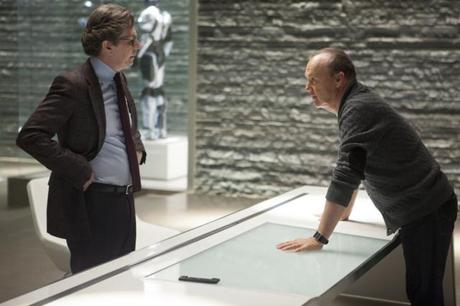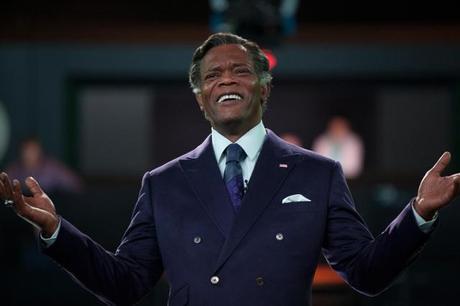
Plot: In the year 2028, global syndicate OmniCorp is the worldwide leader in military combat protection. Their advanced robotic warriors such as ED-209 have made the world a safer place–or though they would have you believe. Unfortunately for OmniCorp CEO Raymond Sellars (Michael Keaton), Congress has banned any robotic military products in the United States. Sellars desperately needs a product he can “sell” to the American public. A product with the precision of a machine but the conscience and empathy of a human. Along with his marketing team and scientist Dennett Norton (Gary Oldman), Sellars plans to put a man inside the machine. But how? Enter Detroit detective Alex Murphy (Joel Kinnaman). When Murphy suffers a near fatal car bomb explosion at the hands of gangster Antoine Vallon (Patrick Garrow) opportunity presents itself for OmniCorp. After convincing Alex’s wife Clara (Abbie Cornish) to allow Norton and company to rebuild Alex, Murphy emerges as Detroit’s deadliest threat to crime: Robocop.
Review: The original Robocop holds a special place in my heart, as it was the first rated R movie I ever saw. I must have been ten or eleven years old and was just fascinated with the whole experience. Everything from Kurtwood Smith’s diabolical Clarence Boddicker, to the social satire (even if I was too young to appreciate it), to having the crap scared out of me when Paul McCrane’s Emil Antonowsky was melted by toxic waste. Even though twenty-seven years have passed, and the film doesn’t hold up quite as well as it used to, I still revisit the film from time to time. You can imagine my trepidation when I found they were remaking the classic 1987 original. However, the previews and the cast looked promising so I went into the film with a modicum of hope.

So does the 2014 version of the iconic 80s science-fiction film succeed? Not really. While there are some good points to director Jose Padilla’s film, Robocop proves to be a bland and tepid science-fiction movie leaving the viewer wondering why the film was even made. Although Robocop isn’t as terrible as another of Paul Verhoeven’s films that was remade a few years ago, Total Recall, True Grit this movie is not.
Although the 2014 version of Robocop tries to explore social issues just like the original, the attempts ring hollow. For example one of the first sequences of the film involves an investigative reporting team checking out how robots are making society safe out in the Middle East. As might be expected, things go horribly wrong when several suicide bombers blow up numerous ED-209s. It’s a thinly disguised representation of America’s military occupation at various places overseas. The message is about as subtle as the fire fight surrounding the sequence. I have to give credit where it’s due, Padillha’s action sequences throughout the film are masterful, particularly the sequence where Alex initially trains against drones and a smarmy military tactician, Rick Mattox, played brilliantly by Jackie Earle Haley. Padillha would have almost have been better served by eliminating the social commentary altogether and making this a straight action film.
While the 21st century edition of Robocop succeeds at its special effects, I didn’t care for its depiction of modern-day Detroit. With the original, Verhoeven created a city on the brink–dark, dingy, and just this side of chaos. I never got the sense of that in Padhilla’s film. Detroit doesn’t come across as a city on the brink that needs a savior. In point of fact his version of Detroit looks BETTER than modern day Detroit. I guess that’s wishful thinking for Detroit’s future? I’m not sure. There’s no desperation there and I feel like if there was, it may have made the film more cohesive.

Speaking of desperate, while I never felt this edition of Robocop was trying to capture the mystique of the original, it definitely was trying too hard at times. Joshua Zutemer’s script often comes across as disjointed and unsure of itself. There wasn’t a cohesive focus. Is the story about Murphy’s revenge? The effect the change has on his family? Or is the film more about the idea of where we are going as a society in terms of robotics and artificial intelligence? Or is the movie a thinly veiled social commentary on governmental regulation and homophobia? There’s just too many things going on in this gumbo of a movie that unfortunately offers no kick or enticing flavor.
Ironically the best part of the film, aside from the excellent visual effects, is the acting. Michael Keaton’s Sellars makes for an interesting villain. He’s not the manipulative, maniacal Dick Jones like in the original. Keaton’s more calculating and ruthless, Hell bent on doing whatever it takes to get his “product” in the United States. Samuel L. Jackson crushes it as Pat Novak, a Fox News-esque television talk show host. Gary Oldman also shines as Norton who’s often at odds with his research and his conscience. (Let’s be honest when is Gary Oldman NOT good in a role?) And as for Kinnaman…he’s actual quite good. His Robocop is definitely different from Peter Weller’s but it has its own unique charms. His struggles to deal with family life after the change make for the most interesting parts of the movie, even if Abbie Cornish is impossibly bland as his wife. While Weller made a better Robocop, Kinnaman is definitely the superior actor.

Other than a few memorable moments, some decent acting, and strong special effects, the 2014 version of Robocop proves to be a weak an unnecessary sequel.
My rating: 5/10
You can follow me on Twitter as Darth Gandalf @cocook1978, on Facebook at https://www.facebook.com/flicktasticmovies, or on my personal movie blog at http://www.whydithavetobesnakes.blogspot.com/.

